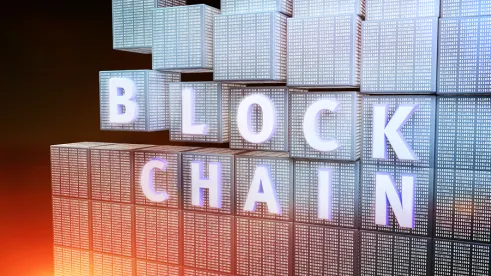Blockchain is rapidly becoming the focus of conversations regarding health care disruption, and for good reason. What started out as a means for cryptocurrency is now making waves in a variety of industries, set to revolutionize how data is stored and shared.
The inability to easily and securely store and share data has long been a burden on the health system. Blockchain poses a solution to that through encryption and highly advanced technological assets which open the doors to health care innovation. Today we see blockchain being used with electronic health records (EHRs) so that a patient’s medical history is easily accessible to him/her, as well as his/her doctors, insurance providers, etc. It’s also providing the “how” in implementing value-based payment agreements, which link payment to performance of a drug or medical device. Blockchain is currently being used both in the private and public sectors, including the FDA and the CDC. While the full potential of this new technology is not yet known, the industry seems eager to find out.
Ahead of this year’s J.P. Morgan Healthcare Conference, we sat down with Lee Schneider, our top blockchain thought leader, to talk specifically about how this new technology is revolutionizing (or has the potential to revolutionize) the health care space.
Q: In layman’s terms, what is blockchain and why is it a topic of such great interest right now, particularly when it comes to the health care industry?
A: Blockchain is a ledger technology that allows people to track digital assets. This is important because a digital asset can be copied an endless number of times. People call this the “double spend” problem. But if you can track each one with certainty, then digital commerce becomes possible because when you move the digital asset on the blockchain ledger, you are certain of its provenance.
Q: From what you have seen in FinTech, is blockchain poised to become health care’s next great disruptive technology? (Or, the buzzword of 2018)?
A: We are working with several health care projects looking to leverage blockchain. Putting patient records on blockchain is one idea; it gives everyone certainty around patient identity and authorization, and allows the patient to track who has permission to view. There are many other possible uses, so I expect that by the end of 2018 health care industry participants will have a lot of good ideas for using blockchain to improve standard operating procedures.
Q: What are the top three areas in health care where blockchain stands to have the greatest impact?
A: Speaking from the position of a health care industry outsider, I would say that payments is ripe for blockchain, as well as creating patient incentive structures for healthy behaviors. I mentioned health records above. We should remember that health records include advanced imaging items as well. Marrying compression technologies with blockchain technology should create really interesting opportunities.
From a legal standpoint, Lee notes that much of the regulation is still in development. As we move toward regulation, he recommends that governing bodies take the approach of “contextual regulation,” or determining which regulatory regimes apply based on the context in which the technology is used. Because blockchain is being considered for use in a variety of industries, Lee notes that it can be difficult to apply a one-size-fits-all regulatory method.



 />i
/>i

